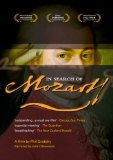| Reviews & Columns |
|
Reviews DVD TV on DVD Blu-ray 4K UHD International DVDs In Theaters Reviews by Studio Video Games Features Collector Series DVDs Easter Egg Database Interviews DVD Talk Radio Feature Articles Columns Anime Talk DVD Savant Horror DVDs The M.O.D. Squad Art House HD Talk Silent DVD
|
DVD Talk Forum |
|
|
| Resources |
|
DVD Price Search Customer Service #'s RCE Info Links |
|
Columns
|
|
|
In Search of Mozart
Simple. Straightforward. Beautiful. Commissioned for the 250th anniversary of Wolfgang Amadeus Mozart's birth, 2006's In Search of Mozart is a lucid, superbly produced look at the classical composer's life and music. Filmed all over Europe in the places where Mozart lived and worked, In Search of Mozart also features a host of today's most celebrated musicians and artists performing selections from of a multitude of the composer's works, giving the viewer a stunning, intimate crash course in Mozart's oeuvre.
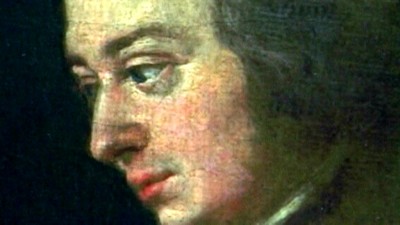
If you're like me, I know Mozart from his various musical pieces I've heard throughout my life, and from Milos Forman's film, Amadeus, and that's about it (and it's been years since I've seen it last). I'm certainly no scholar of his work or life, nor am I fluent in musical terminology or history except on the most basic level. Apparently, according to the interview Phil Grabsky gives as a bonus to this disc, In Search of Mozart's the writer/director's limited background with the composer and his work wasn't all that dissimilar from mine and I would assume, most people's. Attending a concert and being moved by the experience, Grabsky wondered what he knew of Mozart the man, and realized his only information came from the Forman film. So he set out on a Herculean task: to film, on his own, every available work of Mozart's being performed in the world, supplemented by interviews with historians and artists giving their perspectives on the composer. And he produced a remarkable portrait of the man and his work that differs quite strongly from the Mozart I would imagine most viewers visualize - Forman's Amadeus (and to a much smaller percent, those who saw Peter Shaffer's Amadeus on the stage).
Beginning with Mozart's birth in Salzburg, Grabsky, through interviews with various historians, first mentions the extraordinary circumstances of Mozart's physiognomy. A child prodigy as a performer of the piano and string, Mozart's hands at five years old should not have been developed enough to skillfully manage a keyboard, yet by that age, he was besting his father, Leopold, who was considered one of the best musicians in Europe at that time. His preternaturally advanced skills didn't stop at performing; by five years old, Mozart was already composing musical pieces which, although obviously not as accomplished or as deep as his later, more mature work would be, still showed an amazing knack for acquired conventions and clichés of other composers of that day, transformed into proficient, delicate works of his own. Contrary to the impression I always had that young Mozart and his child prodigy sister Nannerl were "dragged" around Europe by their father like performing seals for European royalty, Grabsky paints a portrait of a willing and rambunctious little boy who loved the travel and attention he received on this grand tour of Europe...even if his father didn't always appreciate the sometimes low pay from royals who might give a trinket in appreciation for the young genius' work, instead of needed cash or a court appointment. This extended trip abroad is also portrayed as critical in expanding Mozart's musical background, exposing him to the world's greatest composers and musicians - events which immeasurable shaped Mozart, who was said to be able to memorize a work just by hearing it once.
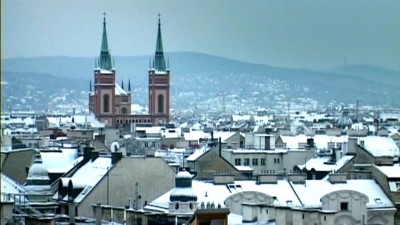

As he grew into his teenage years, his father Leopold tried countless times to secure a court position for young Wolfgang as his son continued to perform and compose pieces on commission. Eventually procuring a position as a composer for The Archbishop of Salzburg, Mozart proves to be an at-best indifferent employee, creating just as many if not more pieces outside his official duties, composing at this time his first true "mature" works...at the age of 18 and onward, incorporating musical conventions of the time and rearranging them with surprising effects, but in a manner not too surprising to alienate his increasingly affectionate audiences. At this juncture in the doc, Grabsky makes a point of articulating his view, through Jonathan Miller, that Mozart was far from the "mad genius" stereotype that is often applied to the composer (and which Forman played up to some extent with Tom Hulce's enthusiastic performance). Instead, Mozart here is portrayed as an otherwise normal, fun-loving youth (who indulged in scatological humor as was the norm of that - and any, for that matter - day) who worked quite seriously and prodigiously to compose, showing no signs whatsoever of madness in his personal life. However, a trip to Paris when he is 22 years-old leads into a failed romance, and with the death of beloved mother and developing rift with his father, Mozart's work deepens with this tumultuous time in his life.
However, by 1782, Mozart has finally resigned from his court appointment; he's working in Vienna, and he marries Constanze, the younger sister of the woman who had before rejected him. Becoming fashionable and successful in Vienna as a performer and composer, Mozart's happiness is matched by his prodigious output, marred only by the lost of his first son in 1982, an event that some see as influencing his famed Sonata in B Flat for Keyboard. Another key point that Grabsky makes here is that Mozart wrote for money, not out of some obsession to compose. His facility with composing was unprecedented, but it was employed for a less exalted purpose than "art for art's sake" - it was a job to Mozart (I love how they detail how Mozart could compose anything, anywhere, whether it was sitting at his desk, or inbetween shots at the billiards table. Another low point comes in 1786, when his father and his third son die, with his next opera Don Giovanni, perhaps reflecting Mozart's solemn mood. A court appointment as Imperial Composer sounds better than it is, since the salary is considerably less than what he was making as an independent composer, and his debts begin to mount (were his financial and spiritual troubles reflected in his dark, brooding Symphony in G Minor #40?). Again, going against the grain of the usual popular interpretation of Mozart's final year, Grabsky points out that 1791 was actually quite a productive, happy time for Mozart. He was beginning to make money again, his son Franz is born, Mozart composes The Magic Flute and the Concerto in A for Clarinet (a piece that Grabsky interprets as Mozart asserting the life force, not hinting at a premonition of his own end, as has been the accepted view). Mozart's final piece, Requiem in D Minor occupies him right up to his death bed, which Grabsky firmly states came from rheumatic fever and kidney failure - not from poisoning.
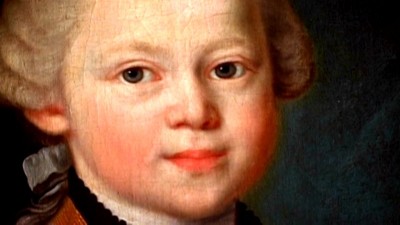
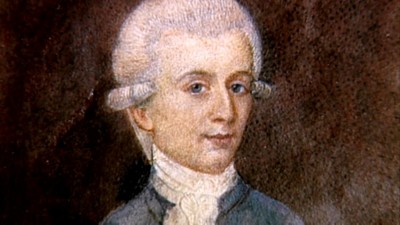
Just from a visual standpoint, In Search of Mozart is gorgeous, with director Grabsky operating his own cameras to beautiful effect, capturing a stillness to the locations that meshes perfectly with the steady, rhythmic editing structure by Phil Reynolds. As for the narration that Grabsky wrote, it too avoids verbal fireworks in favor of simply-conveyed information (read nicely by Juliet Stevenson, along with Samuel West voicing Mozart and other actors enacting real-life participants from letters written at the time) which neither comes off as too academic nor too dry (you don't have to know a thing about Mozart or classical music to understand the historical timeline). Historians featured in interviews here include Nicholas Till, Harry Halbreich, Stanley Sadie, Josef Mancal, Bayan Northcott, Volkmar Braunbehrens, Giovanni Carli Ballola, Cliff Eisen, Jonathan Miller, and Gunther Bauer. More importantly, Grabsky has captured numerous Mozart works here, with performances and discussions of the works by artists such as Frans Bruggen, Ronald Brautigam (who, when working out Mozart's Symphony in E Flat #1, a composition Mozart wrote when he was 8-years-old, perfectly illustrates what was amazingly advanced about this child), Roger Norrington, Thomas Allen, Adam Fischer, Janine Jansen (who performs an achingly beautiful rendition of the Concerto in A for Violin), Imogen Cooper and Louis Langree (who are equally adept teaching us on the piano about Mozart's advanced "call and answer" technique in his compositions), Renee Jacobs, Gerald Finlay, Stefan Herheim, Lada Valesova (another good explanation of Mozart's technique at the piano), Lang Lang, Renee Fleming, Charles Mackerras, and Thomas Allen. While the historians have the facts, I found the artists' interpretations of the works utterly fascinating, with all of them conveying quite strikingly the passionate relationship they have with the pieces (and to a person they're articulate and well-spoken about their love of Mozart's music). Of course, in the end, it's the music that can't help but dominate (and it's too bad that this two hour doc couldn't accommodate longer passages from his works), but to writer/director Phil Grabsky's credit, his evocation of historical Mozart, of Mozart the man, more than holds our attention, as well.
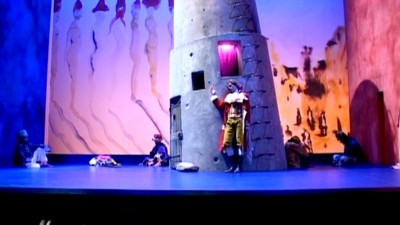
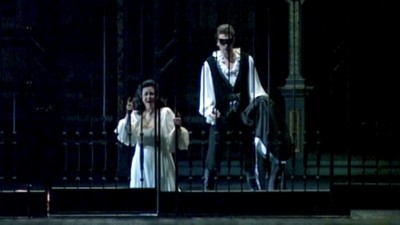
The DVD:
The Video:
Presented in an anamorphically enhanced, 1.77:1 widescreen transfer, In Search of Mozart looks pristine, with no compression issues, rich color, and a sharp, sharp image. The cinematography, by Grabsky, is impressive for this kind of film.
The Audio:
I was a little surprised this wasn't released in 5.1, but the 2.0 stereo mix is adequate. No hiss, and the recording level is fine. There are subtitles available in English, French, German, Italian, Japanese, Chinese, and Spanish.
The Extras:
There's an informative interview with Grabsky included here where he gives some good detail on how In Search of Mozart was conceived and executed (it's unfortunate that whoever shot the interview insisted on that strange close-up of the director).
Final Thoughts:
A terrific documentary. You don't need to know a thing about Mozart to get a crash-course in his life and music in In Search of Mozart. Beautiful to look at and listen to, In Search of Mozart imparts a lot of information in an accessible, entertaining fashion - this isn't a dry lecture by any means. I highly recommend In Search of Mozart.
Paul Mavis is an internationally published film and television historian, a member of the Online Film Critics Society, and the author of The Espionage Filmography.


|
| Popular Reviews |
| Sponsored Links |
|
|
| Sponsored Links |
|
|
| Release List | Reviews | Shop | Newsletter | Forum | DVD Giveaways | Blu-Ray | Advertise |
|
Copyright 2024 DVDTalk.com All Rights Reserved. Legal Info, Privacy Policy, Terms of Use,
Manage Preferences,
Your Privacy Choices | |||||||









